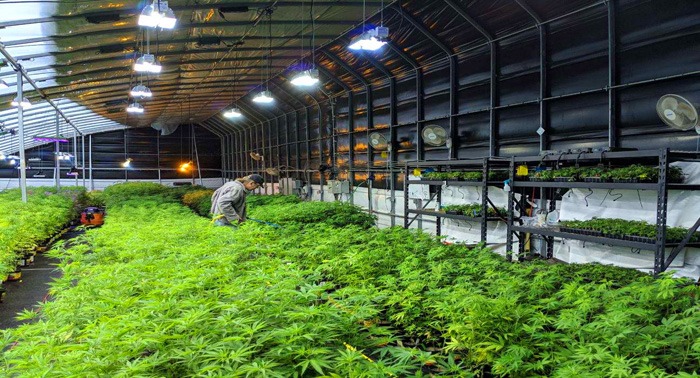BY DR LLOYD COVENS
For both returning farmers—and the new hemp farmers in Arizona, Wisconsin, So. Carolina, Pennsylvania, New Mexico, Kansas, Illinois and Michigan—unresolved issues on crop insurance, banking/loan challenges, and a major learning curve for farmers have all brought great uncertainty.
But the difficult choice between reaching for a bigger pay-day from CBD versus waiting for all the new USDA policies to be confirmed– means thousands are likely to go ahead with a 2019 gamble. Moving up an expected set of national rules for hemp growing, the U.S. Department of Agriculture expects to issue an “interim final rule” for policies surrounding the planting, testing and disposal (over non-eligible) of industrial hemp.
The Difficult Choice
“No final products” will be addressed in the rulemaking, which is set to issue formal rules based upon passage of the 2018 Farm Bill. In Florida, Gov. Ron DeSantis signed the new hemp bill into law, making the possession of CBD legal statewide, and allowing the Florida Department of Agriculture to begin setting rules for the 2020 hemp growing season.
On signing, DeSantis vowed he would not allow Florida to become a legal use state while still governor. But the 2016 statewide vote to approve medical MJ in the state passed with more than 72 percent approval. A full RMJ measure is expected to be on Florida’s ballot for the November 2020 general election.
In California, Assembly Bill 228 is heading to the full Senate floor, where a yes vote is anticipated. The bill overrides the state’s health department, which last year said that CBD could not be combined in foods, beverages or cosmetics until some regulatory approval at the FDA occurred.
“These farmers are trying to survive”
At this time, more than 95% of the hemp growing is aimed at the CBD market, according to hemp expert and farmer Veronica Carpio, of Grow Hemp Colorado. Carpio was hopeful that the post-Farm Bill environment would also hasten the rollout of US-based industrial hemp for fiber (ie., hempcrete, plastics, textiles) and fully-FDA approved hemp seed (hemp cake) for nutritional non-CBD hemp grain and seed.
Carpio, who produces her own certified VCStar Hemp Seed, is afraid that many farmers may be feeling pressured by “genetics and clone” companies who see 2019 as a watershed for growth. “These farmers are trying to survive and feed their families,” Carpio adds.
“This hemp industry has grown organically,” says Portland hemp veteran Jon Thomas of JMT Enterprises, but now “the government is trying to step in and set rules for a crop they don’t fully understand.” As overgrowth of cannabis in Oregon explodes (reports say the state has more than 6.5million pounds of un-sold MJ), Thomas sees hundreds of former marijuana growers moving into the hemp sector.
Confusion over CBD status at the Food and Drug Administration has left many hemp hopefuls confused on not allowing CBD in foods, beverages and cosmetics. “We have a bad situation where the Farm Bill has called hemp-CBD totally legal,” notes Thomas, but the FDA has thrown cold-water on full implementation for a myriad of consumer products for human and animal consumption, and pain and skincare topicals.
Gross Revenues to $85,000 per Acre
With such confusion, business planners and investors cannot reliably get a handle on the expected per-pound price for high-quality CBD biomass this fall. Pricing estimates from the Fall, 2018 harvest generally reported sales of $27 to $33 per pound, and certain higher sales reports of $45-$50 pound for early 2019.
Compared to break-even for growing cotton, corn or soybeans—farmers can look at the potential for CBD-hemp at 1000 to 2000 plants (yielding 1 pound each) at easily generating gross revenues of $35,000 to $85,000 per acre. But the impact of unknown demand conditions—plus the inability to predict the growth of new hemp processing centers—may shake up eventual sales outcomes this fall.
One estimate sees the buyers moving to buying farmer product based on the percentage of CBD, with pricing running $2 to $4 for each percent. Banking and credit union support for hemp depositors remain steady, but there is still no official loan help from the U.S. Farm Credit Administration.
 –Based in Denver, Dr. Lloyd Covens, DBA is a seasoned cannabis industry journalist and the publisher of West420 NewsWeekly. Writing his doctorate on diffusion of innovations, Covens has been an expert journalist/researcher for 20 years chronicling new technology, global television and renewable energy advancements. He has reported on developments in the cannabis and hemp industry with weekly reports since 2014 covering the western U.S. for legal medical cannabis, recreational sales and hemp production. Covens is also the creator of the annual CO Hemp CBD conference held in Pueblo, Colorado.
–Based in Denver, Dr. Lloyd Covens, DBA is a seasoned cannabis industry journalist and the publisher of West420 NewsWeekly. Writing his doctorate on diffusion of innovations, Covens has been an expert journalist/researcher for 20 years chronicling new technology, global television and renewable energy advancements. He has reported on developments in the cannabis and hemp industry with weekly reports since 2014 covering the western U.S. for legal medical cannabis, recreational sales and hemp production. Covens is also the creator of the annual CO Hemp CBD conference held in Pueblo, Colorado.


